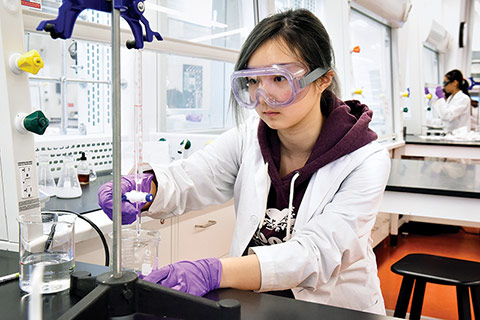In what University of Toronto president Meric Gertler called “an historic investment in Canadian science and innovation,” the federal and provincial governments are joining with the university to provide almost $190 million to upgrade nearly half of U of T’s research labs over the next two years.
The Lab Innovation for Toronto (LIFT) project, announced in July, will lead to a full renovation of 546 labs – providing state-of-the-art research facilities to an estimated 1,100 researchers and 5,500 students. Work has already begun and will be complete by the spring of 2018.
“These investments will help us attract and retain talent from around the world and across the country. It’s really critical,” said President Gertler. “We’re very well known as a research powerhouse but . . . if the [lab research] space is substandard it limits what this talent and faculty and student body can do. By modernizing that space the sky is really the limit.”
The LIFT project will affect all three campuses and nine academic divisions. The facilities to be renovated include not only medical, dental, biology, chemistry and engineering labs, but also a former horse barn north of Toronto now used for ecological research, a green roof on the historic 1 Spadina Avenue building (the new home of the John H. Daniels Faculty of Architecture, Landscape, and Design), an electro-acoustic music studio at the Faculty of Music and many others. At the University of Toronto Scarborough, the campus vivarium and the S-Wing research labs will undergo $17.8 million in renovations, while the University of Toronto Mississauga’s Davis Building will get a $17.1 million upgrade.
The labs to be renovated by the project are, on average, 50 years old and comprise more than 50,000 square metres of inefficient space – the equivalent in total size to 15 soccer pitches, said Scott Mabury, vice-president, university operations. If U of T was building all-new labs instead of rejuvenating existing facilities, the cost per square metre would be approximately $12,000, totalling close to $650 million, he added. “The renovations will modernize U of T’s research labs to increase usable space and enhance the quality of the research and learning environment,” Mabury said. “They will also improve air handling, climate and electrical systems.”
The university will provide $91.8 million, while the federal and provincial governments will contribute $83.7 million and $14.3 million respectively for a total of $189.8 million. “The LIFT project will equip our brilliant scholars, students and staff with the cutting-edge facilities they need to learn, collaborate and discover,” said President Gertler. “The modernization of these labs will also reduce our greenhouse gas emissions significantly. The University of Toronto greatly appreciates the federal and provincial governments’ support of postsecondary education and research, and their leadership in ensuring Canada secures its place among global leaders of science and technology.”
Mario Ostrowski is one of the researchers who will benefit from the renovated research facilities. A renowned HIV scientist affiliated with St. Michael’s Hospital and U of T’s Faculty of Medicine, Ostrowski said there is fierce competition among research institutions for graduate students and post-docs. State-of-the-art labs will help U of T recruit the best and the brightest students, he said, and will also inspire existing researchers and students to greater achievements. “Just like great architecture inspires people every day to achieve excellence, if you’ve got a nice lab that’s state of the art, it inspires and stimulates people to produce excellence.”






No Responses to “ A Historic Investment in Canadian Science and Innovation ”
It's exciting to see the upcoming renovations! Can't wait to take a look at them in a few years. Love U of T as always!